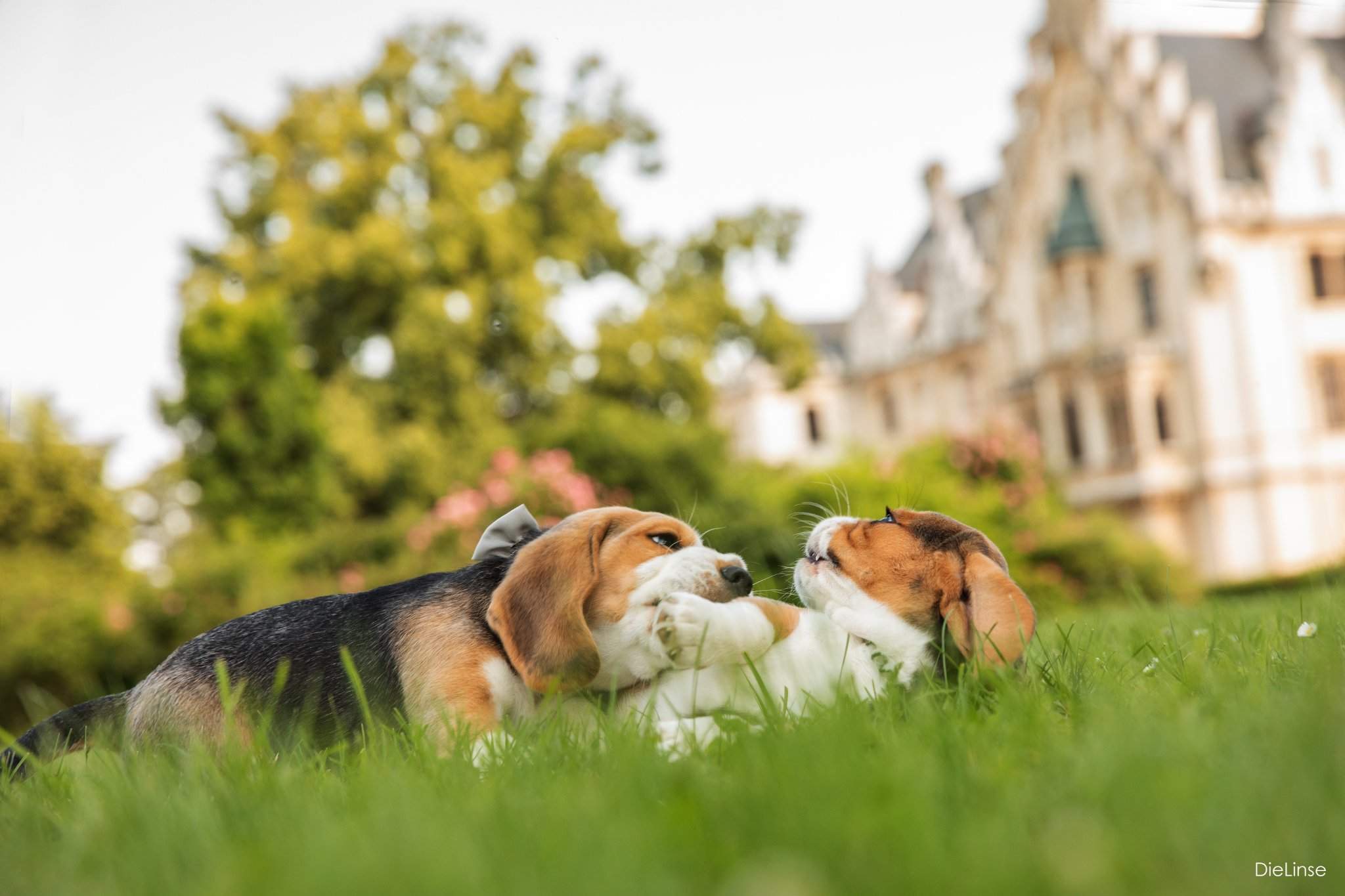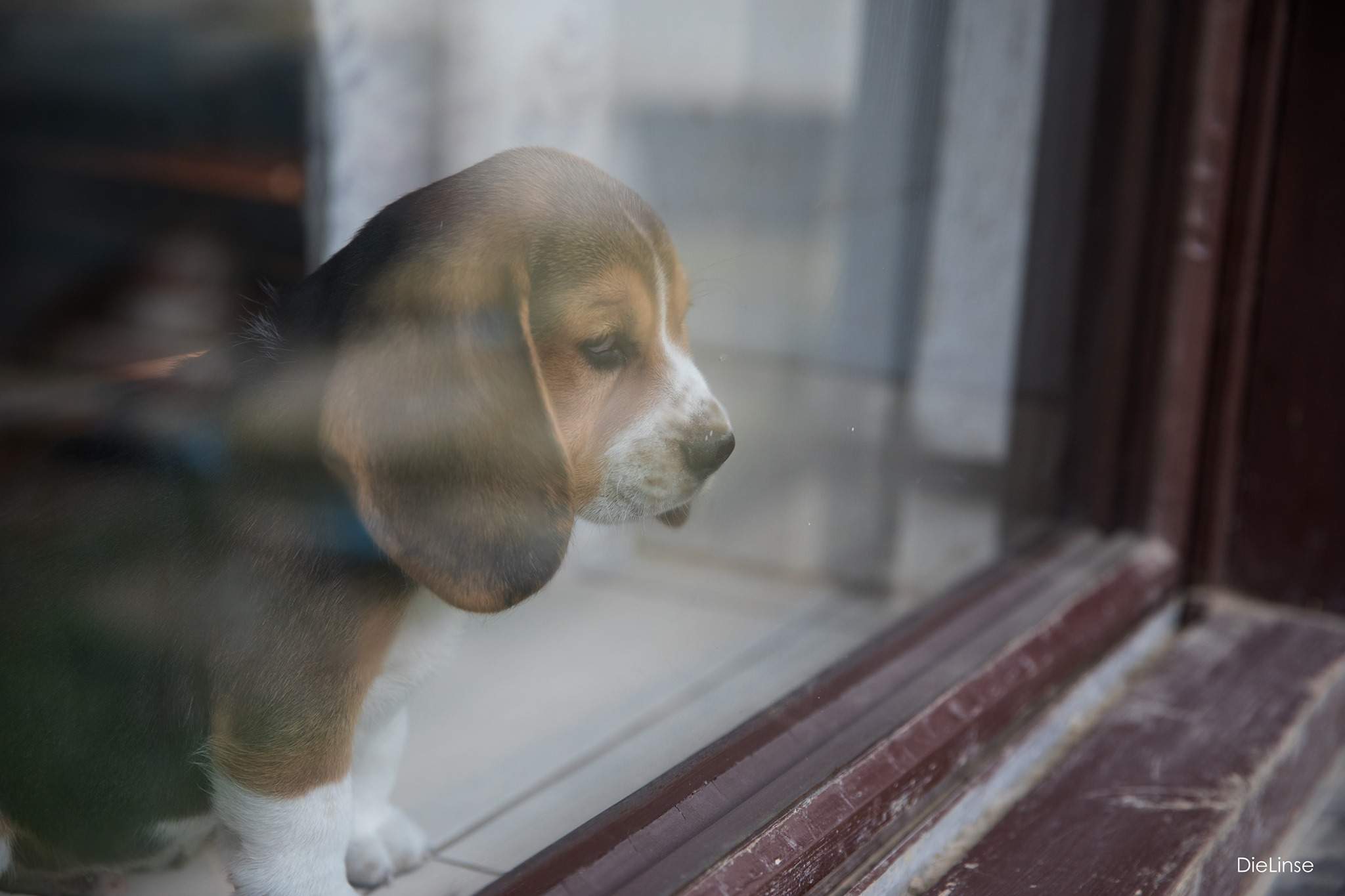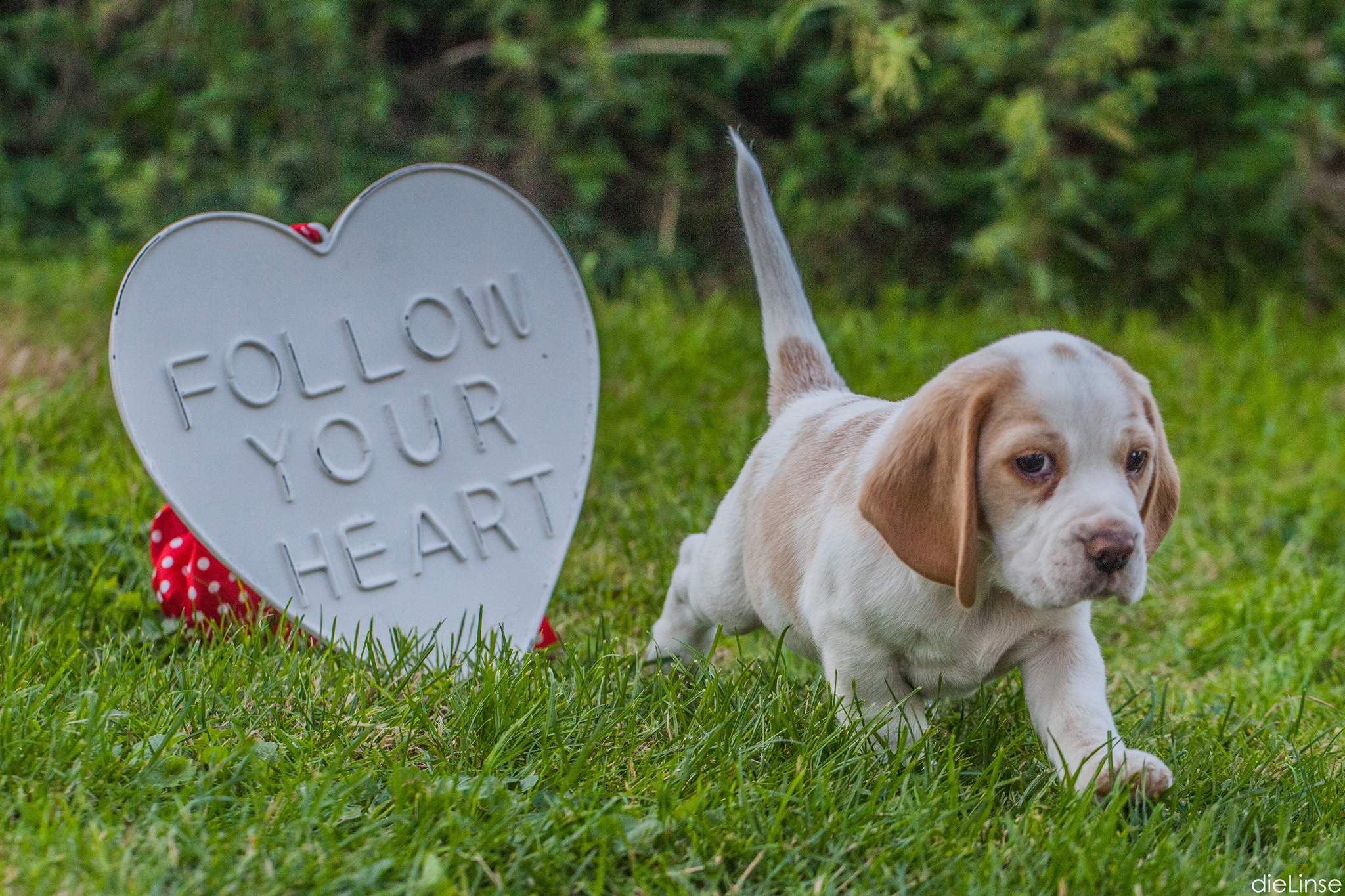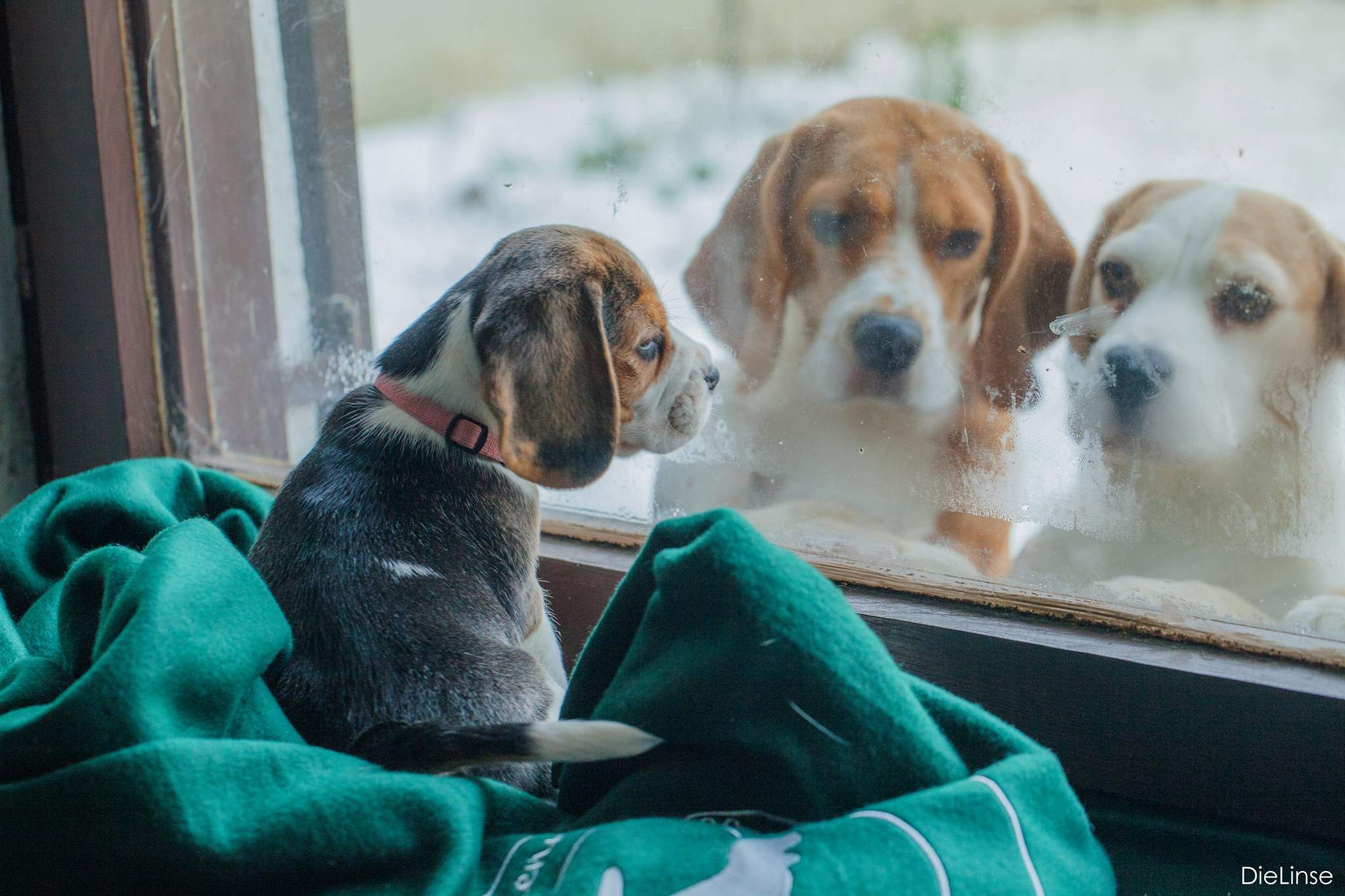Early work plays off
Taking a puppy home has has many advantages, but also a lot to do. On the one hand, it takes a lot of discipline and consistency to train the puppy right from the beginning, but on the other hand, a lot of diligence to prepare him appropriately for his later life. One thing is definitely true: those who responsibly take care of the raising and rearing will later have their dream dog!
Ideally, the puppy will be picked up at us at 8 to 9 weeks.
This has to do with the development phase in which he is currently. In about the 4th to the end of the 7th week, the dog goes through the so-called sensitive socialization phase, formerly also known as the imprinting phase. During this time he should be confronted with many different environmental stimuli at us in order to be optimally prepared for his later life. In this phase, the puppy can memorize certain impressions and experiences best of all. In addition, puppies are now building a stronger bond with their social partners (ie dogs and humans living in their pack). It is therefore very important to visit your puppy if possible several times during this phase. This is the only way the dog has the opportunity to memorize you in terms of smell, sound and appearance.
The breeder's responsibility
In the sensitive phase, as already mentioned, it is very important to desensitize dogs in all possible areas. If a breeder does not do this, in my opinion he can be classified as dubious.
We do desensitization in different levels:
Acoustically the puppies are desensitizated by gently getting to know the sounds of a blender, vacuum cleaner, lawn mower or a slamming door for example. Visually, by getting to know moving plastic bags, but also cars, bicycles and many different people. If there is a possibility taking the puppies to retirement homes, in front of hospitals, schools or playgrounds is very important, because they will see very different people everywhere there. If later on a dog barks on special people this often means he didn't had enough different people to know during the sensitive phase. Odor desensitization should not be underestimated either. Our puppies not only get used to the different feel of different floors, but also to their different smells. And last but not least, getting used to a wide variety of tactile stimuli is also important. We set up a true adventure course for our puppies in our home. Climbing opportunities, various play objects, wobble boards, ball pits and other creative challenges offer the puppies the chance to get to know and improve their bodies and motor skills. In addition to desensitizing various stimuli, it also makes sense to consciously sensitize young dogs to various stimuli at this early stage. For example, we as breeder use the whistle every time the puppies are fed, it will be a breeze to train a safe recall later. After the sensitive socialization phase, it is time for the further socialization phase – i.e. from around the 8th week of life – precisely the period in which the puppy ideally moves to its new home. During this phase, dogs are heavily influenced by their social partners, who are seen as role models and guides, and develop their personalities. If puppies continue to live with their mother, siblings and possibly other pack members, there is a possibility that these social partners will be viewed as teachers. In contrary, what usually people think, this makes the puppies life not better but makes it unnecessarily difficult. He learns the models in the pack but after moving to his home he has to start the social learning process with his owners. It's both your and your puppy's interest to bring him home if possible by 8-9 weeks of age.
The new home
New smells, a new environment, a new social environment. For puppies, moving into their new home is a turning point. Nothing is more important to the puppy than safety. Torn out of his usual pack, he should now at least know who to look to for guidance. In dogs, this works primarily through clear structures. When dogs gain the learning experience that their new people behave like real leaders, it is of course easier for them to relax and orientate themselves. This means that the adults in the new family should do everything they can to convey this role authentically. This not only includes giving the dog a lot of physical closeness, but also setting limits in the right place. For example, it has been agreed in the family beforehand that the kitchen is taboo for the dog, this should also be made clear to the puppy on its first tour of discovery. If you let him into the kitchen again and again during this new phase, a subsequent ban will be incomprehensible to him and moreover more difficult to teach. Setting limits and knowing them with your social partners is part of every relationship. In a pack of dogs, dogs couldn't afford to have conflicts on a daily basis, they have to deal with more important things such as acquiring food or protecting themselves from enemies. That's why rules are so important. It is also advisable to get your puppy used to a transport box from the start, which is always placed in your environment. In the puppy period, dogs are phisycally very close, so it is advisable to place this box right next to your bed at night. In this way you give your dog the feeling of being with you without learning to "stick" to you too much. In addition, such a box also has the advantage that you notice immediately when your dog is getting restless and has to go outside. It's worth its weight in gold for a quick housebreak.
Everyday life
It is important to teach your dog to always orientate itself towards you and to give him a strong sense of security. Even when meeting other dogs, there is no such thing as "puppy protection", as is so often thought - this only exists in the own pack! You want to be the sovereign guide, so it's also important to behave accordingly "cool" if for example a big dog runs towards your puppy. Hysteria or hectic are counterproductive with dogs.
Being active outside (with you!) is also very important right from the start. If your dog learns from day one that you are more exciting than the leaf flying by or another dog, it will be easier for you to call him later or to walk him loosely on a leash. So start immediately with common nose games, light retrieval exercises. He shall first learn to be attentive to you before he is allowed to run and play with other dogs.
There is no form of training that cannot be practiced in moderation at this early stage. Starting now with a few steps on the leash, training the recall or teaching the puppy, for example, to spit things out on "Off" makes it so much easier than first training him out of undesirables and then painstakingly rebuilding the correct behavior.
Even if all these and many other rules sound tedious, we have to keep in mind that we have decided to adopt a dog. We take him out of his familiar environment and practically oblige him to optimally adapt to our bizarre human world. That is why we absolutely owe it to our dogs to teach them our requirements in a friendly manner as early as possible and to integrate them responsibly into our society.



